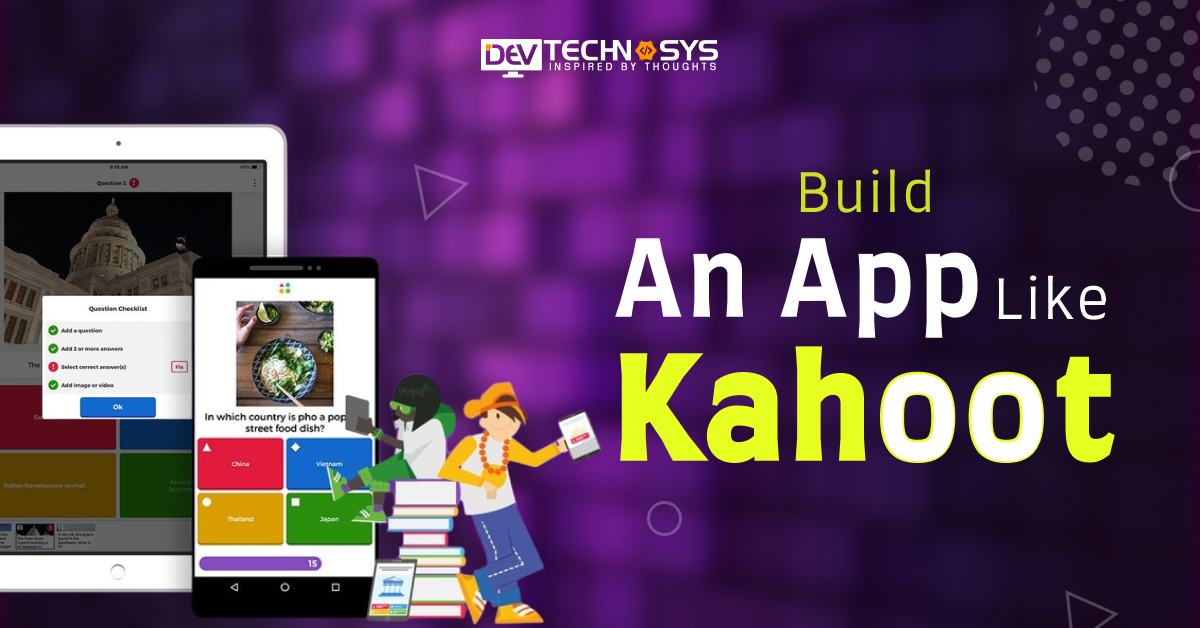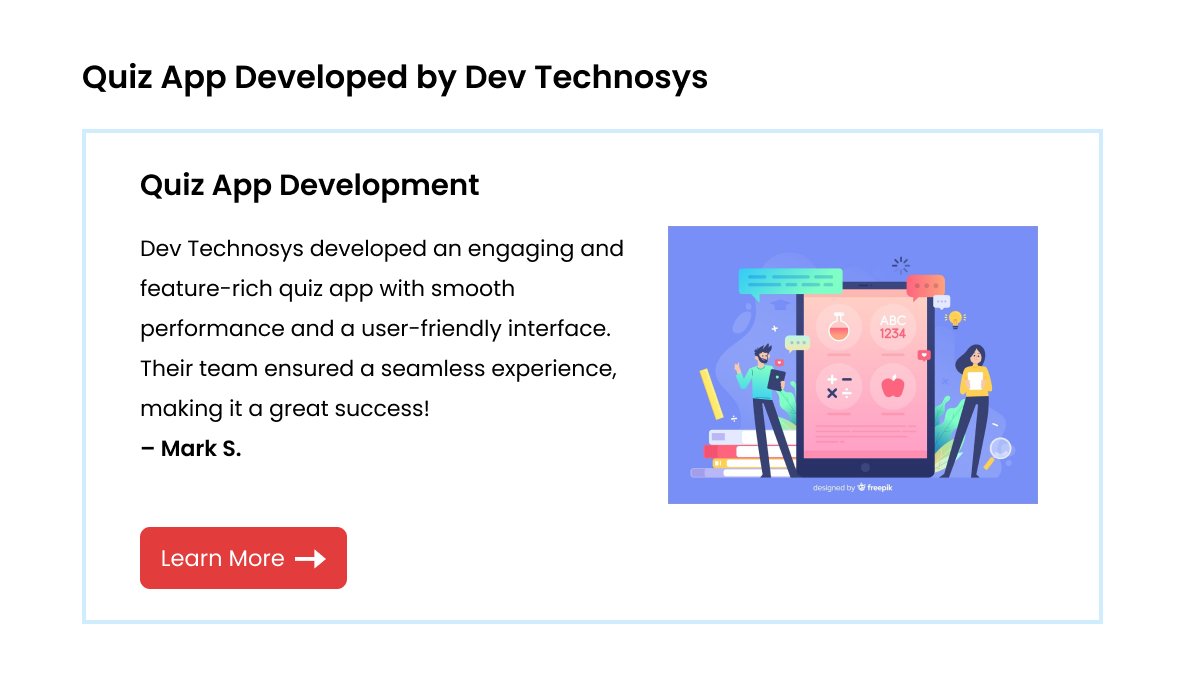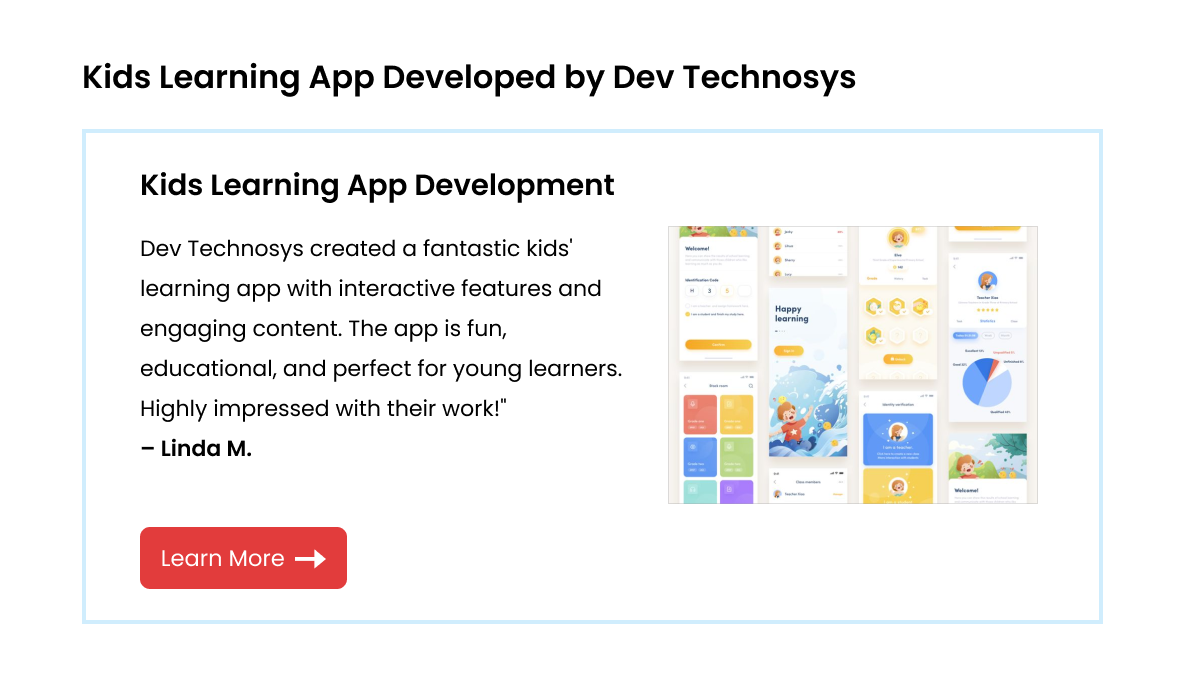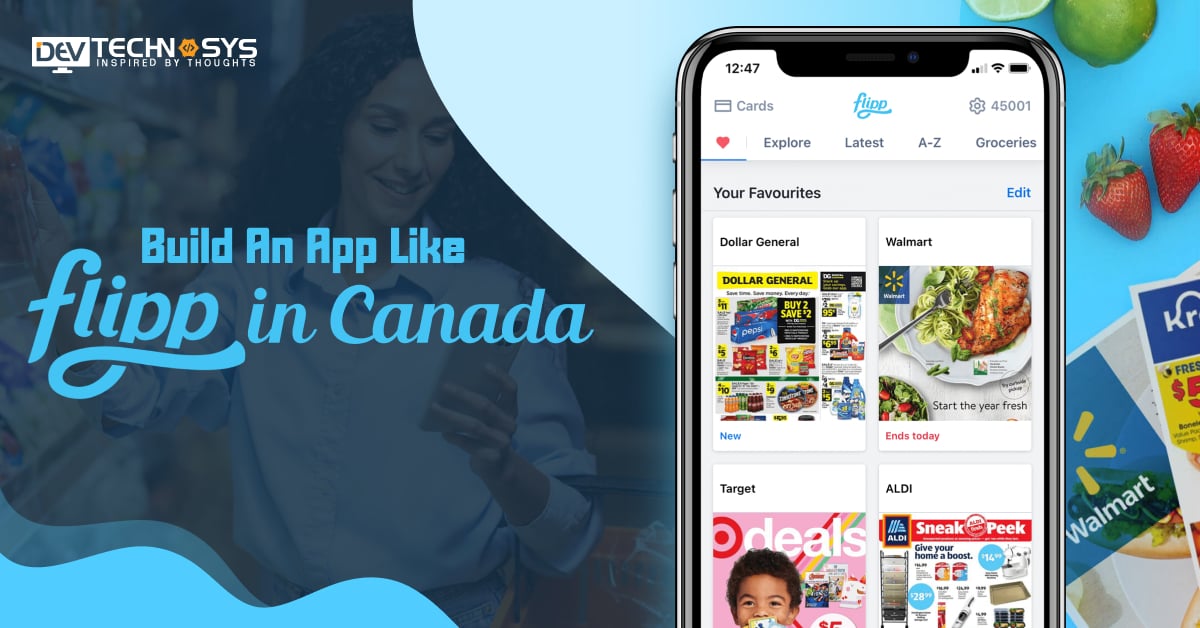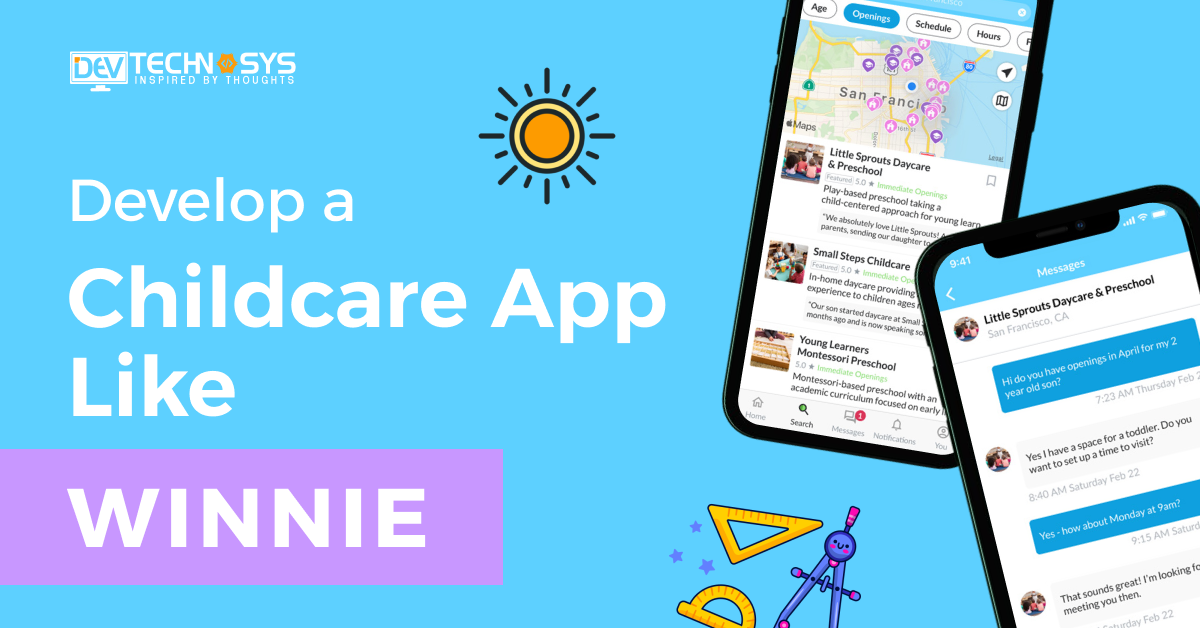If we talk about today’s time, then today’s generation spends most of its time on mobile phones and in the digital world. That’s why most industries are shifting their business digitally, and no matter they also increase their overall business as compared to offline business.
Have you ever imagined an app for learning for all types of professions and age groups, it behaves like a fun activity, and users can freshen up their minds.
Welcome a quiz app, Kahoot. It provides a learning quiz in a game format that can increase user engagement and allow users to compete with other users in the quiz.
In a recent scrolling of a web page, we found that learning and quiz apps were valued at around $60.25 billion in 2025. This shows an expected growth of around $75.29 billion by the end of 2029.
The above data shows that building an app like Kahoot is one of the most profit-generating opportunities for businesses.
Let’s start to explore how to build an app like Kahoot and why most businesses are ready to invest in it.
What Is Kahoot?
Kahoot! is a game-based learning platform that is used to develop and play educational challenges, surveys, and quizzes in social settings, businesses, and classrooms. Using their devices, players respond in real-time to multiple-choice questions, scoring points for accuracy and speed. Apps like Duolingo have become enjoyable and participatory due to their high level of engagement.
Participants can enroll using a special game PIN, and instructors and facilitators can make their own quizzes or use pre-existing ones. In addition to promoting healthy competition, Kahoot! aids in the reinforcement of knowledge in a variety of topics, including language, history, and arithmetic.
- Quizzes can be made by users with a variety of question kinds, including multiple choice, true/false, and open-ended.
- During the game, players receive immediate feedback on their responses, which supports their learning.
- Online game app like Kahoot is entertaining and competitive because multiple players can join at once.
- Kahoot similar apps allow teachers and facilitators to evaluate learning progress by tracking performance through comprehensive reports.
Market Analysis of Online Learning and Educational Apps
- In 2025, learning and quiz apps were estimated to be worth $60.25 billion. By the end of 2029, this indicates an anticipated growth of almost $75.29 billion.
- According to the global market, the revenue
of learning apps is anticipated to grow at a 5.81% annual rate (CAGR 2025–2029). - By 2029, there will be 1.0 billion consumers in the market for online learning platforms.
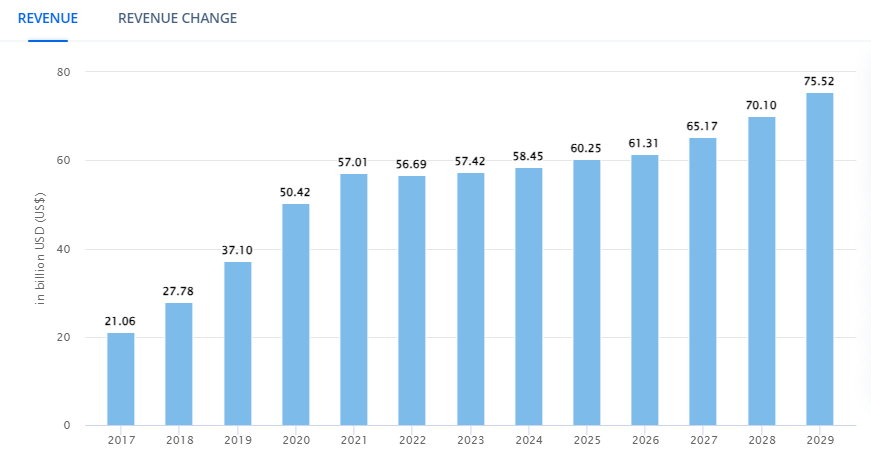
- As per a recent study, by 2029, user penetration is predicted to reach 16.7%, up from 14.3% in 2025.
- China has the most significant user penetration rate in the online learning platforms market, with a forecasted rate of 21.8%.
Top 10 Quiz Apps Like Kahoot
The following table lists 10 quiz applications that are comparable to Kahoot, together with information about their download counts, ratings, year of release, and platform accessibility. So, here we provide the best skill development apps for kids and any age group peoples:
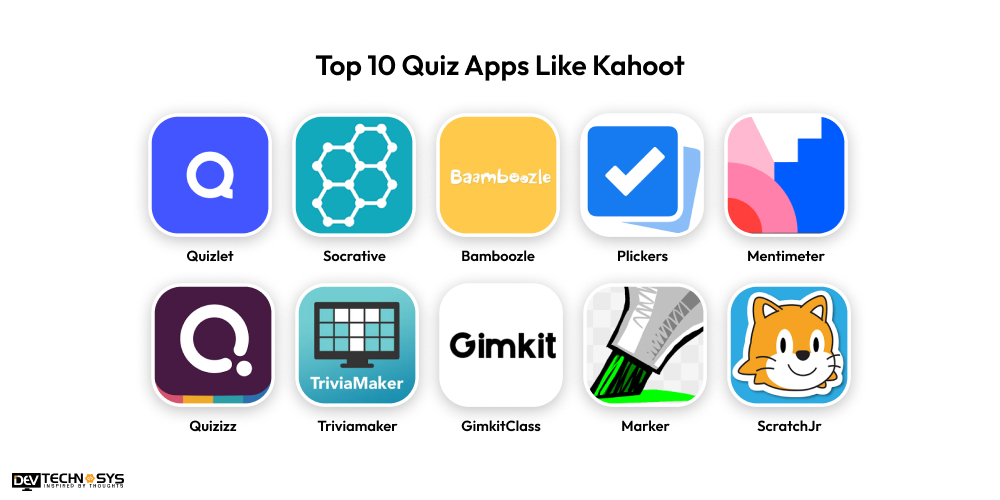
Apps |
Download Users |
Stores Ratings |
Apps Launched On |
Platform Accessibility |
| Quizlet | 100M+ | 4.8 | 2005 | Android, iOS, Web |
| Socrative | 10M+ | 4.6 | 2010 | Android, iOS, Web |
| Bamboozle | 5M+ | 4.4 | 2007 | Android, iOS, Web |
| Plickers | 1M+ | 4.4 | 2012 | Android, iOS, Web |
| Mentimeter | 10M+ | 4.5 | 2014 | Android, iOS, Web |
| Quizizz | 50M+ | 4.7 | 2015 | Android, iOS, Web |
| Triviamaker | 1M+ | 4.6 | 2016 | Android, iOS, Web |
| Gimkit | 5M+ | 4.8 | 2017 | Android, iOS, Web |
| ClassMarker | 1M+ | 4.7 | 2006 | Web |
| ScratchJr | 10M+ | 3.9 | 2014 | Android/iOS |
Why Do Entrepreneurs Invest in Kahoot Clone App Development?
For a variety of strategic reasons, entrepreneurs fund the creation of clone apps such as Kahoot, but the main ones are scalability, profitability, and market need. The following are the crucial elements:
- High Demand for Interactive Learning Tools
- Proven Business Model
- Customization & Brand Identity
- Monetization Opportunities
- Scalability and Growth
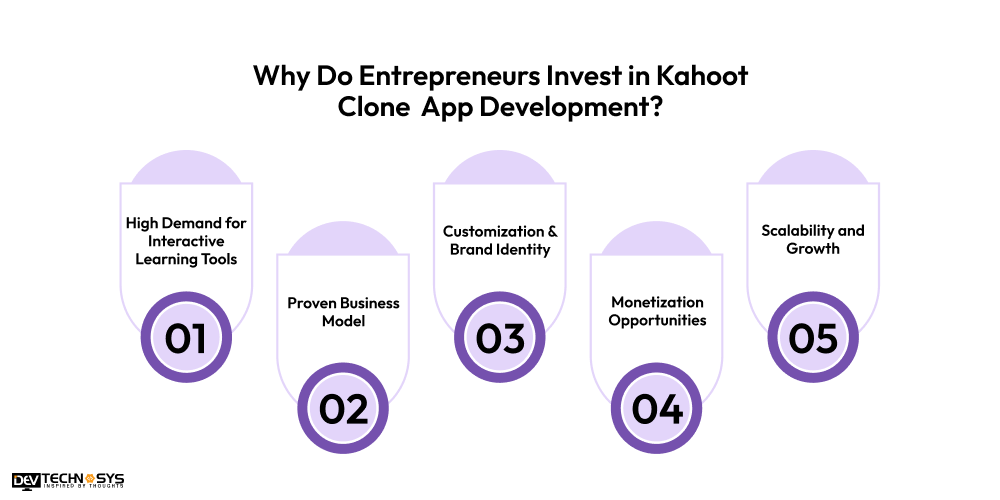
1. High Demand for Interactive Learning Tools
As a result of the COVID-19 pandemic and the subsequent move toward online and remote learning, there is a growing need for educational platforms that are engaging.
Develop a Quiz app like Kahoot gained popularity in schools, colleges, and businesses because to its interactive and gamified approach to learning. Entrepreneurs see a chance to develop comparable platforms in order to meet this need.
2. Proven Business Model
In the field of game-based learning, Kahoot has made a name for itself. This tested model can be used by entrepreneurs making clone app development investments to reduce risks. Educational apps for preschoolers can expand on an idea with a proven user base and income potential rather than beginning from zero.
In essence, clone software lowers barriers to market entry, enabling developers to duplicate the fundamental features while incorporating distinctive improvements.
3. Customization & Brand Identity
Business owners can modify clone software to target various markets or incorporate special features that address particular user requirements or industry sectors. A Kahoot quiz clone might be altered to concentrate on business training, language acquisition, or even fitness tests, for instance. They may target underserved markets and set their platform apart from rivals thanks to this personalization.
4. Monetization Opportunities
Free alternatives to Kahoot can be made using a variety of methods, such as in-app purchases, premium content, subscription models, and advertising. Education apps like Quizlet have the potential to be quite profitable with the correct user engagement and marketing techniques.
Businesses, colleges, and institutions, for instance, are prepared to spend money on premium features like extra quiz capabilities, personalized branding, or sophisticated analytics.
5. Scalability and Growth
After it has been created, Kahoot clone apps may be readily expanded by adding new features, expanding to new areas, and drawing in additional users. The possibility for scalability rises with the growth of online learning, which makes purchasing clone software an alluring option. At last, businesses can easily grow their businesses, and it can provide perfect scalability.
How To Build An App Like Kahoot?
By understanding these steps, you can create a mobile app like Kuhoot that can easily reach to higher success rates. It includes several essential processes: planning, design, development, and launch. Here’s a step-by-step approach to building a quiz app like Kahoot:
- Define Your App’s Requirements and Goals
- Choose Your Best Platform
- Design UI/UX
- Features And Functions
- Backend Infrastructure Process
- Testing and QA
- Launching and Marketing
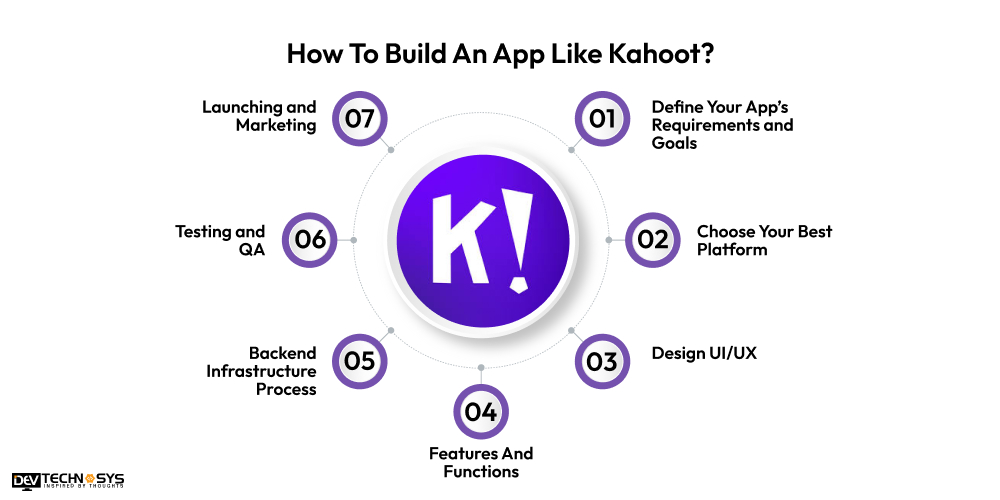
1. Define Your App’s Requirements and Goals
The first step is to define what your app will do and who your target audience is. Think about what makes your app unique—will it focus on education, corporate training, or entertainment? Set clear goals:
Do you want the app to be for classrooms, remote teams, or general users? Establish your app’s main features like real-time multiplayer, customizable quizzes, and gamification elements such as leaderboards and badges.
| What are your project’s basic or core requirements? |
| Define your future goals. |
| Which quiz apps are more trending or successful in this competitive market? |
2. Choose Your Best Platform
Decide whether you want to develop a web app, mobile app (iOS, Android), or both. Each platform comes with its own set of challenges, so choose based on your target audience. For wider reach, you may opt for cross-platform development using tools like React Native or Flutter. For better performance and more control over the user experience, consider developing native apps for each platform.
| Are you looking for scalability in the platform you choose? |
| What are the key features you look for in a platform? |
| How do integrations with other tools impact your platform choice? |
3. Design UI/UX
The user interface should be simple, intuitive, and engaging. Users should be able to easily navigate through quizzes, view results, and interact with others. Hire dedicated developers from an kids learning app development company to focus on a clean design with vibrant colors, fun animations, and clear navigation. An easy-to-use app increases user retention and overall satisfaction.
| What are wireframes in UX design? |
| What tools do you use for prototyping? |
| How do you ensure a responsive design? |
4. Features And Functions
Moving to the fourth stage of development, you first need to identify the core or advanced features that you want to install in your app. It includes features such as user registration, access dashboard, account management, and push notifications. After that, identify your primary and secondary users from the targeted audience.
| What key features do you need the platform to have? |
| Does the app support offline functionality? |
| Are push notifications supported in the app? |
5. Backend Infrastructure Process
In this another development process. The backend process handles user data, quiz management, real-time multiplayer interactions, and performance tracking. Technologies like Node.js, Ruby on Rails, or Django are commonly used. Ensure that the backend is scalable and secure to handle large volumes of users and data. Cloud services like AWS or Google Cloud can provide the necessary infrastructure.
| How scalable is the backend infrastructure? |
| Does the backend support real-time data processing? |
| How is backup and disaster recovery managed in the backend? |
6. Testing and QA
Test your app on multiple devices and platforms to identify bugs, ensure smooth performance, and improve the user experience. Perform functional, usability, security, and performance testing.
A smooth and bug-free experience is essential for user retention. Hire mobile app development from a gaming app development company to check the app’s quality and make sure that quality is not decreased during the implementation phase.
| What types of testing are performed (unit, integration, UI, etc.)? |
| How is bug tracking and reporting managed? |
| Does the QA team perform cross-platform testing? |
7. Launching and Marketing
Once the app is developed and tested, it’s time to launch. Create a marketing plan that includes app store optimization, social media promotions, influencer partnerships, and content marketing. Offering free trials or limited-time offers can attract more users. After launch, gather user feedback to fix bugs and improve features.
| Publish your app on selected platforms like Android and iOS. |
| Use the best marketing techniques. |
| Assign the post-maintenance phases to maintain the app’s performance. |
10 Must-Have Features of Online Learning or Quiz Apps
Together, these characteristics make learning more flexible, efficient, and entertaining, which improves user happiness and knowledge retention.
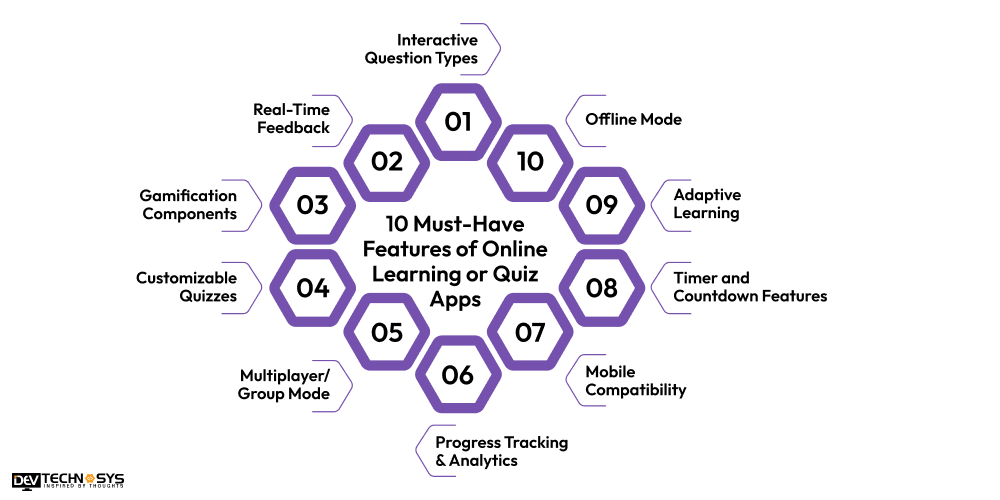
-
Interactive Question Types
Kahoot! alternatives provides a variety of question formats are supported, including multiple-choice, true/false, fill-in-the-blank, and open-ended questions.
-
Real-Time Feedback
E-learning app like Kahoot enable users to be kept motivated and learning is reinforced when they receive immediate feedback on their responses, including justifications for wrong selections.
-
Gamification Components
Best preschool apps, Including elements such as badges, leaderboards, point systems, and timers, make learning more enjoyable and competitive.
-
Customizable Quizzes
Teachers can adapt information to meet particular needs by creating bespoke quizzes with unique branding, questions, and topics.
-
Multiplayer/Group Mode
Fun learning games like Kahoot facilitating several users’ real-time involvement in a single session encourages social learning and cooperation. Which is particularly helpful in team or classroom settings.
-
Progress Tracking & Analytics
Kahoot similar apps allows users and instructors to monitor progress, examine performance reports, and pinpoint areas in need of development.
-
Mobile Compatibility
Users may learn and take quizzes while on the road with ease if an app is compatible with smartphones and tablets.
-
Timer and Countdown Features
Best kids learning app, including timers in questions or quizzes as a whole, makes them more difficult and instills a sense of urgency. It aids students in time management during tests or practice sessions.
-
Adaptive Learning
The app can modify the questions’ level of difficulty according to the user’s performance or progress, offering a customized learning experience that caters to each user’s needs.
-
Offline Mode
Kahoot! alternatives enabling users to access content without requiring an internet connection guarantees that learning may proceed offline or in places with inadequate connectivity.
The Cost To Develop An App Like Kahoot
The cost to develop an app like Kahoot can vary widely based on several factors, including the complexity of features, platform (iOS, Android, Web), design, and location of the development team. On average, the education app development cost for a basic version can range from $8,000 to $18,000.
More advanced features like real-time multiplayer support, advanced analytics, custom branding, and high-end security could push the cost to $25,000 or more. Ongoing maintenance, updates, and marketing will also add to the overall expenses, so entrepreneurs should consider long-term costs when planning the budget.
Cost To Build An App Like Kahoot
Education App Development |
Estimated Cost |
Time Frame |
| Basic App Development | $8000 – $13000 | 2 to 4 Months |
| Mid-Premium App Development | $13000 – $20000 | 5 to 8 Months |
| High-Premium App Development | $25000+ | 9+ Months |
What Are The Major Factors That Affect Kahoot Clone App Development?
The time and cost of developing a clone app like Kahoot are influenced by a number of factors. These elements are crucial in determining the app’s overall success, usability, and functionality:
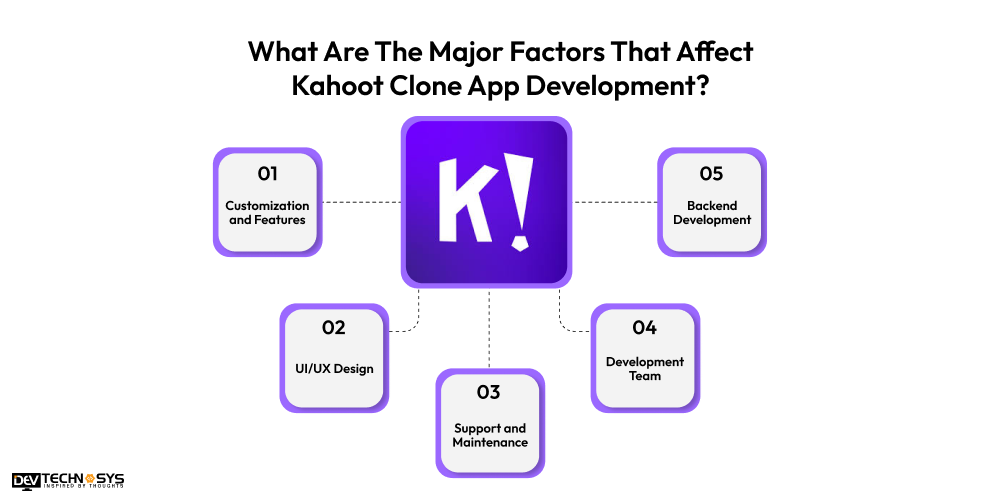
1. Customization and Features
It’s important to consider the variety and level of complexity of features you wish to incorporate into your clone software. While more complex features like real-time multiplayer, data analytics or connectivity with third-party systems demand more development time and experience, simpler elements like timers and multiple-choice questions are simple to create.
Features |
Cost Estimation |
| Core Features | $8,000 – $12,000 |
| Advanced Features | $15,000 – $20,000 |
2. UI/UX Design
For engagement, a design that is both aesthetically pleasing and easy to use is crucial. Complex designs and personalized branding may increase the time and quiz Android app development costs. Accessibility across devices, responsiveness, and easy navigation should all be guaranteed by the design.
Design Quality |
Cost Estimation |
| Basic Design | $8,000 – $12,000 |
| Complex Design | $15,000 – $22,000 |
3. Support and Maintenance
Because support and maintenance guarantee continued functionality, security, and user pleasure, they have a big impact on the creation of clone Kahoot apps. To maintain the app competitive and free of bugs, regular upgrades, bug patches, and feature enhancements are necessary. Kahoot app development cost are increased by these initiatives, which also need a committed staff to provide ongoing assistance.
Maintenance Phase |
Cost Estimation |
| Simple Maintenance Phase | $2,000 – $4,000/year |
| Complex Maintenance Phase | $8,000 – $10,000/year |
4. Development Team
Costs are greatly impacted by where your development team is located. Compared to developers in Asia or Eastern Europe, developers in North America and Europe typically charge higher prices. The overall speed and quality of development are also influenced by the team’s prior experience working on related projects.
Developer’s Location |
Cost Estimation |
| Asia Pacific | $8,000 – $15,000 |
| North America | $15,000 – $20,000 |
| Eastern Europe | $13,000 – $18,000 |
| Western Europe | $16,000 – $25,000 |
5. Backend Development
For managing multiplayer functionality, managing quiz sessions, and storing user data, a strong backend is essential. The time and kids learning app development are increased by the need for server resources and safe, scalable infrastructure.
Backend Development |
Cost Estimation |
| Basic Backend Process | $10,000 – $18,000 |
| Premium Backend Process | $20,000 – $28,000 |
5 Monetization Techniques of Online Learning or Quiz Apps
Monetizing online learning or quiz apps can help generate sustainable revenue streams while offering value to users. Here are five effective techniques:
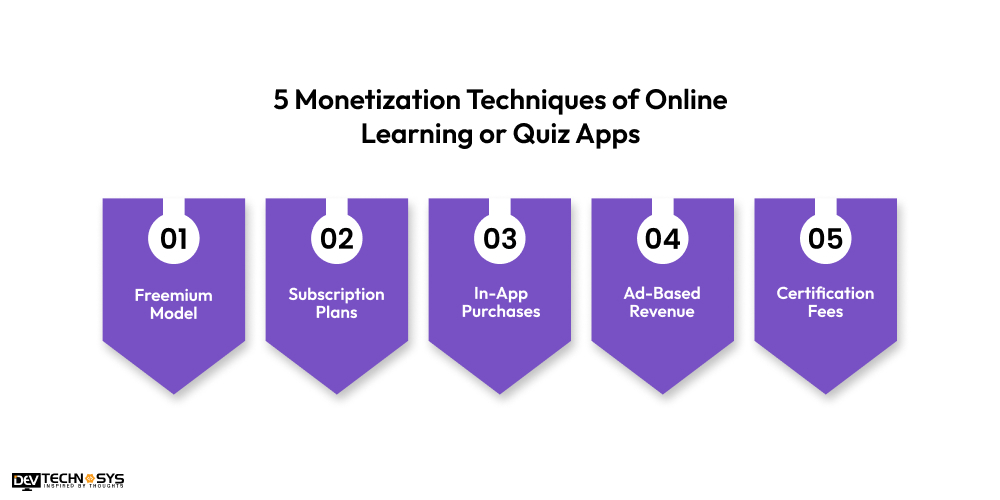
1. Freemium Model
One of the most popular methods for making money off of online learning and quiz apps is the freemium model. While premium services (like individualized study plans, sophisticated statistics, or ad-free experiences) are available through a paid subscription, basic functions—like access to a restricted number of quizzes or question types—are free.
Businesses can take advantage of both free and paying users by enabling consumers to test the app before deciding to purchase a version.
2. Subscription Plans
Recurring income can be produced via a subscription-based business strategy. Access to premium content, extra features, or unique quizzes can be purchased on a weekly, monthly, or annual basis.
Developers can build an app like Brainly with varied user types, from individual learners to major corporations or educational institutions requiring substantial material and capabilities. It includes many different subscription tiers (e.g., Basic, Pro, or Enterprise).
3. In-App Purchases
Users can purchase extra features, such as more quiz packs, themes, unique challenges, or sophisticated learning resources, through in-app purchases. According to the mobile app development company, this model delivers an income stream without requiring a continuous membership, making it ideal for consumers who wish to personalize their learning experience.
4. Ad-Based Revenue
An efficient income source for Kahoot clone apps that aim to attract a sizable number of non-paying users is advertising. In between levels, during wait times, or during quizzes, advertisements might be included. While maintaining free app access, developers can make money from free users by utilizing banner advertising, interstitials, or rewarded video ads, in which users view ads to gain points or unlock features.
5. Certification Fees
Charging users for certificates when they finish a course or quiz in educational apps might enhance their educational experience. These credentials might be particularly alluring to students or professionals who want to highlight their accomplishments. Additionally, companies or groups can provide branded certifications, turning them into marketable product.
Conclusion
Now, we are at the end of this blog. It takes meticulous preparation to create an app like Kahoot, which includes picking the correct features, picking the proper platform, and creating an intuitive user experience. Selecting monetization tactics, guaranteeing scalability, and investing in strong backend infrastructure are crucial.
Entrepreneurs can develop a competitive and lucrative quiz app by emphasizing dynamic, captivating experiences with real-time multiplayer, configurable quizzes, and statistics. Long-term success requires frequent updates and ongoing maintenance.
You can contact an education app development company to create an app like Kahoot with unique functionalities and a cost-effective budget.
Frequently Asked Questions
Q1. How Much Does It Cost To Make An App Like Kahoot?
The cost to make an app like Kahoot typically ranges from $8,000 to $25,000, based on features, design complexity, platform selection, and development team location.
Q2. How Much Time Does It Take To Make An App Like Kahoot?
Creating an app like Kahoot can take anywhere from 3 to 6 months, depending on feature complexity, platform selection, team size, and the need for specific designs and functionality.
Q3. What Technologies Are Required To Build An App Like Kahoot?
There are various types of programming technologies that are used to develop Kahoot! Alternatives:
- Java
- Python
- Swift
- C++
- Flutter
Q4. What Monetization Tactics Can I Implement For My Quiz App?
Here, we provide the best monetization techniques that can generate new income sources:
- Subscription Plans
- Freemium Model
- Advertising
- Transaction Fees
- Certification Fees
